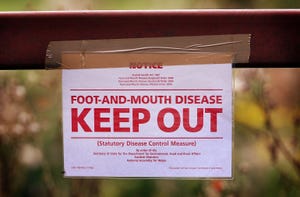Monthly guide to equine wellness
Zoetis has put together a 12-month calendar to equine wellness.
November 16, 2017

Because every horse deserves quality care and welfare, Zoetis has put together a 12-month calendar to equine wellness.
January
· Schedule spring examination.
Call your veterinarian to schedule your horse’s spring wellness exam and vaccination appointment. The threat of deadly equine diseases like West Nile and rabies is closer than you think. Don’t leave your horse exposed!
· Understand changing senior horse health.
Do you have a horse older than 15 years old? One significant change in senior horses is their immune system, as they can become more susceptible to disease because of their immune system’s inability to work as well as it did earlier in life. Prioritize vaccinations to help prevent disease and, to help him properly process feed and prevent colic risks, schedule routine dental care.
February
· Evaluate your horse’s diet.
Is your horse receiving the nutrition he needs to sustain weight through the winter months? Snow, freezing rain and below-freezing temperatures increase a horse's energy requirements, especially if he's kept in a pasture or outdoor paddock. Maintaining core body temperature can often result in weight loss over winter.
March
· Prioritize horse health.
It’s time for your horse’s spring wellness exam and vaccination appointment. Help ensure your horse’s safety through annual vaccinations against the five core equine diseases: Eastern and Western equine encephalomyelitis, rabies, tetanus and West Nile. Based on your horse’s lifestyle, discuss with your veterinarian whether he needs additional risk-based vaccinations, such as equine influenza, equine herpesvirus, leptospirosis or strangles.
· Prepare for travel – Coggins tests, health certificates and first aid kit.
If you plan to travel with your horse in the coming months, check your files to see whether it’s time for an updated Coggins test or health certificate.
April
· Schedule your horse’s annual dental examination.
Horses require an annual dental examination, at a minimum, to help maintain a healthy weight and perform at their best.
· Request a fecal egg count (FEC) exam.
Ask your veterinarian about conducting an FEC exam for a quantitative assessment of your horse’s parasite burden to identify the frequency of treatment needed.
May
· Deworm your horse in spring.
Parasite levels can be at their highest during the spring and fall, and spring is the ideal time to treat for encysted small strongyles (strongyles in the larval stage).
June
· Follow biosecurity best practices.
In the heat of competition and trail-riding season, make sure you are following biosecurity best practices to help keep your horse healthy while traveling. Bring your own equipment, including buckets, and do not retrieve water from a communal source. Also limit exposure to other horses, especially direct nose-to-nose contact, as strangles and equine herpesvirus can be passed on to your horse from passive carriers. Use caution in communal areas, like grazing areas, as bacterial infections and parasites can live outside of the host.
July
· Help prevent injury.
Fireworks displays can cause not only great disruption to lives of horses but also grave danger and injury due to fireworks-related anxiety. Maintain your horse’s health and safety and, before celebrating July Fourth, ask your veterinarian about prescribing mild sedation lasting up to three hours.
August
· Know signs of heat stress.
Without taking proper steps, heat stress can be a dangerous reality for your horse. Familiarize yourself with the signs of heat stress, which include weakness, stumbling, and increased respiration and temperature. Help ensure your horse’s safety by providing all-day access to fresh water, free choice salt or mineral blocks, and properly ventilated barns.
September
· Prepare for winter.
Winter is soon approaching: make sure your barn and the horses stabled within it are prepared. Do you have a plan for snow removal or have hoof-friendly salt to help prevent injury in the paddocks? Is the roof able to handle extra weight from snow and precipitation? Make sure your horse is comfy-grey-sweater ready for the winter season.
October
· Administer booster vaccinations.
Now is a good time to administer booster vaccinations to help protect your horse’s health. While annual spring vaccinations help offer disease protection and can activate an immune response, the American Association of Equine Practitioners (AAEP) vaccination guidelines recommend at-risk horses be vaccinated for equine influenza and equine herpesvirus, also called rhinopneumonitis, every six months.
November
· Deworm your horse in fall.
The AAEP recommends tapeworm treatment once a year, in the late fall or early winter.
December
· Keep close watch on blankets.
As winter is in full swing, keep a close watch on your horse’s blankets for both fit and condition. Ensure his blanket is snug and does not slide off to one side, which can cause injury.
You May Also Like



